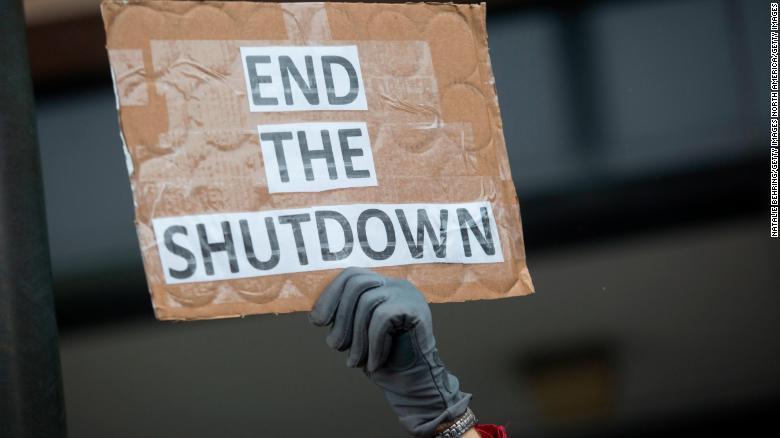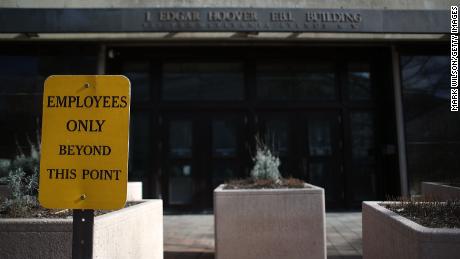Washington (CNN)Conditions behind the walls of the nation's federal prisons are degrading under the government shutdown, where some correctional officers are being forced to work extended shifts, inmate programs are being canceled, and medical and maintenance workers are being asked to fill in for guards.
Those who are on the job are sometimes held over to work 16-hour shifts to fill in the gaps, according to several prison workers and a union president who spoke with CNN.
The situation could put inmates and front line prison workers in danger, said Eric Young, national president of the AFGE Council of Prison Locals.
In one facility -- the Metropolitan Correctional Center in New York -- some inmates are protesting cuts to services during the shutdown with a hunger strike, Young said.
The Bureau of Prisons denied there was a hunger strike, which has also been reported by The New York Times, but did not answer other questions from CNN about conditions in that prison and other facilities.
Correctional officers, like hundreds of thousands of federal employees, have been working for four weeks without paychecks.
They were already among the lowest-paid federal law enforcement officials, Young said, and the union believes the nation's prisons are significantly understaffed by around 7,100 positions.
That means when the paychecks stop, the situation is especially dire.
"We work in an already dangerous and stressful environment, where going to work distracted or fatigued can lead to serious injury or death," Young wrote in a letter to lawmakers this week.
Like other federal employees, correctional officers are facing difficult decisions between purchasing food, gas to get to work and paying bills, Young said.
But for prison workers, unpaid debts can jeopardize the security clearance a federal prison worker needs to stay on the job. Correctional officers who can't pay their debts are considered at risk for bribery by inmates or gangs.
At one federal prison in the southern US, the warden and other senior staffers recently gathered correctional officers to "rally the troops," one of two employees who described the meeting said.
"It was basically we're going to try to rally the troops, we're gonna try to ease people's minds, which they couldn't do," that worker said. Both employees requested anonymity, and CNN is not naming the facility to protect the workers' identities.
The facility has started a food bank in the past couple of weeks to help furloughed employees not getting paid. Several of this worker's coworkers recently had babies, so people are bringing in basic items like baby wipes and diapers and other food to help people who need it.
"Some people might be able to make it one paycheck, making it two is a whole 'nother story because now you are talking thousands of dollars not just a bump in the road," the worker said.
For a number of reasons -- such as being unable to afford gas or childcare -- some correctional officers at that and other facilities have called out sick for their unpaid shifts.
"We care about each other, and the only reason we're coming to work is because we're trying not to screw over other employees," the worker said.
Federal prisons are frequently located in rural areas, so many officers have lengthy and expensive 50- or 60-mile gas guzzling commutes.
Young said prison managers have been forced to cancel or scale back programs -- like education, visitation and recreation -- that require staffers who are either furloughed or call out. Those programs are central in inmates' lives, and his members say they're concerned about assaults or riots when inmate frustration spills over.
The Bureau of Prisons acknowledged in a statement that management may scale back programming when facilities are short-staffed.
"Wardens understand the operations and challenges at the prisons they are managing and have many options to address institution-specific concerns, including staff shortages during the shutdown," the statement said. "Facilities can take steps to temporarily curb or cancel visitation, temporarily reduce or cancel programming, or implement other modified operations."
Staffing shortages, and the BOP's plan to fill gaps, are also leaving officers vulnerable, Young said.
Front line officers are being "augmented" by nurses, maintenance workers, and secretaries, who do not have the proper experience or training of their front-line colleagues, Young, the union president, said.
"That basic training does not provide and show you how to be a correction officer who does that every day of your life," he said. The training they receive is only to "respond in the event of an emergency to assist the correctional staff."
With no end in sight, prison workers say they're not sure what comes next.
One prison worker told CNN, "Recently I've been waking up going, 'is this worth it?'





